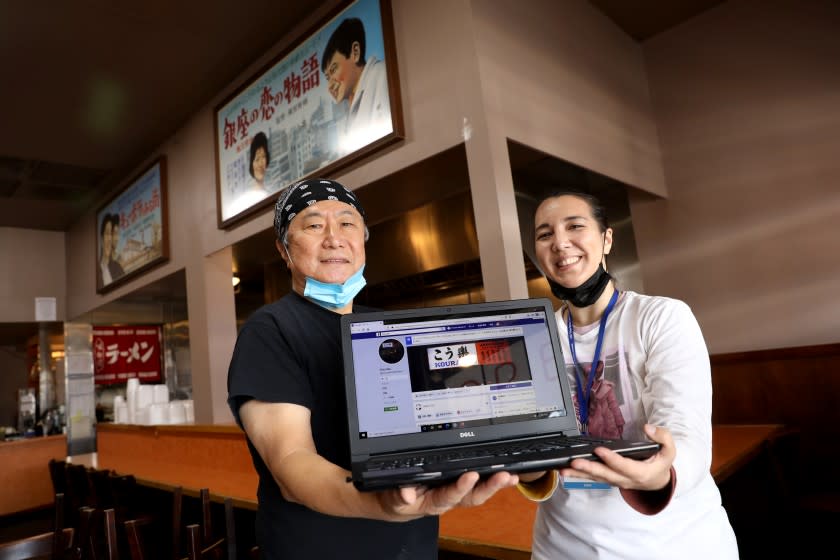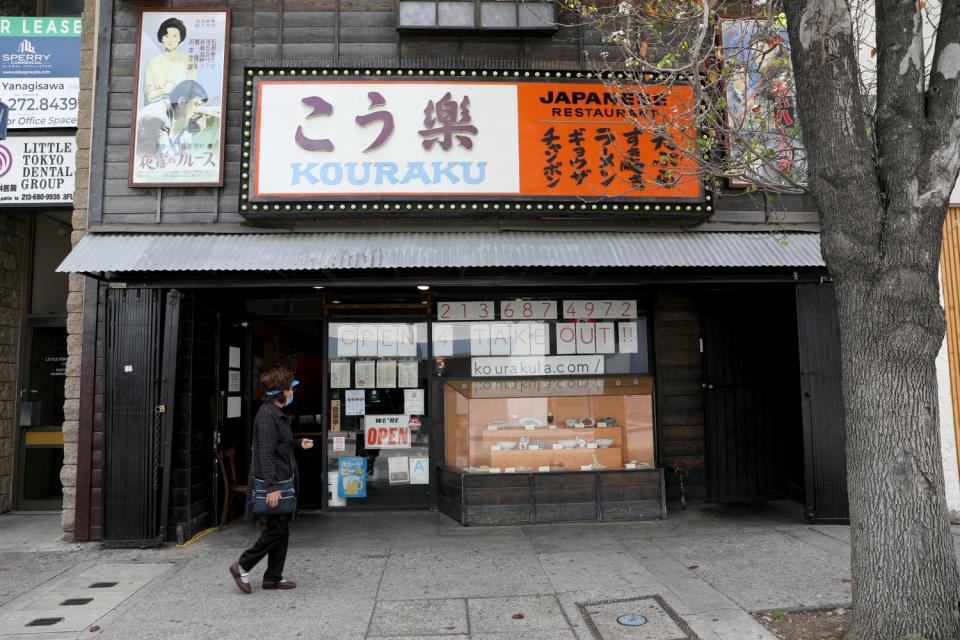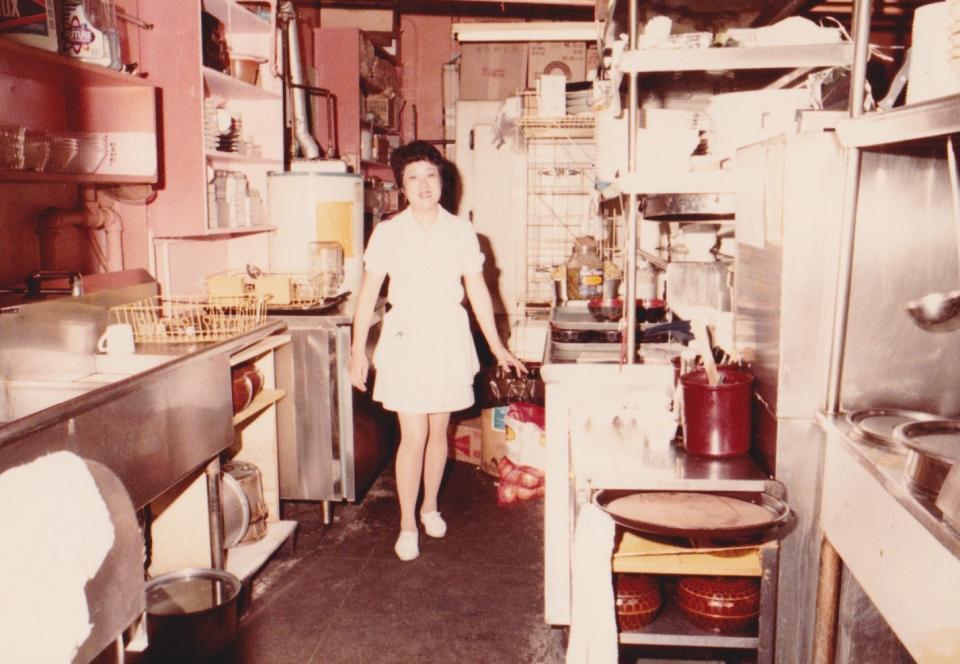To make ends meet, these Little Tokyo restaurants are embracing social media (with some help)

In 1976, the year the restaurant Kouraku opened on East 2nd Street in Little Tokyo, Gerald Ford was president. Nadia Comaneci scored seven perfect 10s at the Montreal Olympic Games and Patty Hearst was sentenced to prison for bank robbery. Social media and online food ordering were decades away.
Now, with the coronavirus pandemic decimating foot traffic and revenue, decades-old businesses are taking unprecedented steps to stay afloat, including offering delivery for the first time and using social media to broadcast their message: We’re still here, and we need your help to keep going.
Last week, Kouraku owner Hiroshi Yamauchi, 67, dove headfirst into the world of social media: “This is my first official post on THE Facebook,” he wrote on Kouraku’s Facebook page. “And yes this analog only old man, thanks to the help of young people is finally on social media.”
The accompanying image shows Yamauchi, with salt-and-pepper hair, hunkered over a PC laptop in his mask and gloves. In the post, he announces the restaurant’s new hours, online delivery (a first) and thanks the community for rallying to assist businesses like his. He even throws a few emojis in there — noodles, a curry, beer and a red heart.
Since the COVID-19 crisis began, small business counselor Mariko Lochridge of Little Tokyo Service Center has worked with handful of restaurants in the neighborhood — like Kouraku, Suehiro Cafe and Mitsuru Sushi and Grill — to increase their online presence, including offering food delivery, creating Facebook pages and posting online for the very first time.
Lochridge, a Japanese American who split her time growing up between Japan and the U.S., has worked full-time in small business assistance since 2018, focusing primarily on native Japanese-speaking populations in places like Little Tokyo, Gardena and Sawtelle. With two entrepreneur parents, Lochridge describes herself as naturally passionate about supporting small businesses. The last few weeks, however, have brought a new urgency and intensity to her work.
She now finds herself sitting one-on-one with business owners to help fill out paperwork, get their social pages up and running, or video chatting for hours to talk about ways to adapt their business models. “I’m way more hands on than I normally am,” said Lochridge, 36, who lives downtown.

Little Tokyo, in particular, is a special place. Established near the turn of the 20th century, it’s America’s biggest and oldest Japantown.
“I want to make sure people have that place to go back to when this is all over,” she said.
In the past, she might meet up with a business owner once or twice a week over a period of months. But with businesses hemorrhaging cash during the pandemic, the need to act quickly is critical.
“Think about yourself as an average citizen and the number of changes you have to make to your day-to-day life,” said Lochridge, describing the frequency of changing regulations and mandates during California’s lockdown. “Small businesses have to act 10 times as fast.”
The neighborhood’s long history and cherished legacy businesses are what make it special — Suehiro and Kouraku, both open since the 1970s; Fugetsu-Do bakery, which is 117 years old. Many residents and business owners are not native English speakers. And, like many minority enclaves, it’s a somewhat insular place.
“They’re very suspicious of outsiders, and they should be,” Lochridge said, given the history of this country — the mass incarceration of people of Japanese ancestry during World War II as an example.
But the characteristics that make Little Tokyo special are also what make it vulnerable, she said. There are cultural and language barriers. There are older business owners who are less tech-savvy. Businesses that are mom-and-pop shops can be at a disadvantage when jockeying for funds from other small businesses — legally defined in some cases as having 500 employees or fewer. That can put a small restaurant and a 480-person tech company drinking from the same pool of resources.
And with social media, there’s a particular challenge with some of Little Tokyo’s older, tech-averse businesses owners: Not only do they have to dive in head-first, but they have to do it immediately.
“Think about your own personal Facebook — if you had to go and put up a social media profile today and then populate it and get the word out,” Lochridge said. “You’re expected to do it over time, right? But in this case it’s like, ‘Oh, I need to do it now, and I need to do it within hours, because every hour I’m bleeding money.’”
For some legacy restaurant owners, this was an unprecedented, somewhat scary step. But it was vital in establishing a lifeline to its customers and to the community.
“Before the COVID-19 crisis, my social media experience was limited to using applications like Yahoo email or YouTube on my mobile phone,” Yamauchi said. “As for Facebook, I truly thought that this was something sold in a bookstore.”
With Lochridge’s help, Yamauchi was able to update his webpage reflecting its new hours (11:30 a.m. until 3 p.m. and 5 p.m. until 9 p.m., seven days a week), set up an Uber Eats account, and claim and begin posting on its Facebook page (Facebook auto-generates pages for businesses, but owners don’t always know how to take control of them). An Instagram account is being worked on.
“Long ago,” he wrote in his first Facebook post, “I remember my father, a very grumpy old man often complaining, ‘These young people, they’re doing nothing!’ And I have also often found myself saying the very same thing. But now, in these dark times in Little Tokyo, young people are coming to me and saying, ‘We are here for you in this time, let’s fight through this together.’”
So far, the post has 202 likes and 31 comments, all of them positive.
One person commented, “You have such a special place in our hearts. Hang in there. We’ll be ordering from UberEats very soon.”
Yamauchi said he’s grateful for the support he’s received. “Many of our regulars and even customers from long ago have reached out to us to offer encouraging messages on social media or order from us,” he said.
“At first, it was just my chef and myself on our own, completely alone,” Yamauchi said. “I was lost trying to figure out what we should do, and at that moment Mariko arrived.”
In her work through the Little Tokyo Service Center, Lochridge works with dozens of businesses in the area. A critical step, she said, is getting a referral to establish trust with the owners. “If they don’t trust you in the beginning, they’re not going to share what their real situation is.” After that, an assessment is made, including an online audit, followed by the creation of an action plan.

Suehiro Cafe opened in 1972 when two sisters from Japan, Junko and Yuriko, realized their dream of opening a restaurant in America. Junko’s son, Kenji Suzuki, was 7 years old when he came to the States and remembers growing up in the restaurant.
“My summer vacation was spent washing dishes,” said Suzuki, 57.
Suzuki, who officially took over the business in 1991, said he’s never seen a downturn this severe.
“The closest thing that comes to it would be the L.A. riots,” he said. “But the riots were a man-made thing, which can be undone by man-made gestures. With this, so much of it is unknown.”
During the crisis, business has dropped by 90%, he said, and he’s cut his staff to three employees from 10 — a cook, a driver and a server to take orders and package the food.
Seeing the urgency, he agreed to take some advice from Lochridge — a “crash course” in social media, as Suzuki put it. Suehiro updated its website and is now offering online delivery for the first time in 48 years. It’s even offering promotions, such as a free roll of toilet paper with orders over $25.
Suzuki, while grateful for the assistance, is still somber about the future. Expanding to delivery is “not going to be nearly enough to cover the basic expense for rent and utilities,” he said. “We’ve already started using our credit cards.”
Suzuki has begun posting regularly to the business’ Facebook page and Instagram — he’s even started doing Instagram Stories.
“I really hesitated in doing social media,” he said. “I was very incompentent on the social network sites, so I didn’t want to go into it.”
But now, all bets are off. “This was kind of a sink-or-swim situation. And I was given a little buoy by Mariko and I’m just trying to hang on as hard as I can.”

